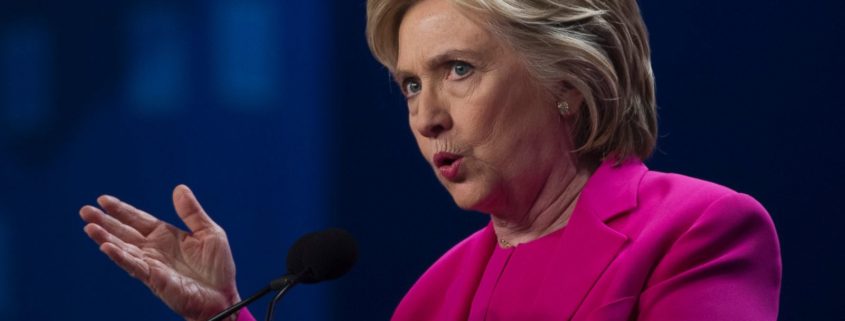FBI report reveals she forwarded classified data to her private email
By Bill Gertz
Documents made public from the FBI investigation of Hillary Clinton’s private server provide clues about the current review of more than half a million emails linked to Clinton presidential campaign vice chair Huma Abedin.
Abedin was questioned by FBI agents and Justice Department officials, including those involved with counterintelligence matters, on April 5.
During those discussions, Abedin revealed that she used four different email accounts while she was deputy chief of staff for operations in Clinton’s seventh floor office at the State Department.
The email accounts included her official State Department account, abedinh@state.gov, the private server account, huma@clintonemail.com, and her private email, humamabedin@yahoo.com. Abedin’s fourth email account was associated with the campaign activities of her estranged husband, former Democratic congressman Anthony Weiner.
The FBI reopened its Clinton email investigation after agents recovered a laptop computer from Wiener that reportedly contains some 650,000 emails now being reviewed by FBI agents. Weiner’s laptop was obtained during an investigation into allegations the former congressman exchanged illicit messages with a 15-year-old girl.
The FBI began reviewing the emails after receiving a search warrant on Monday.
FBI Director James Comey revealed to Congress last week that he ordered the email investigation to be reopened after “pertinent” information was uncovered in the separate investigation of Weiner.
The Wall Street Journal, quoting people close to the FBI and Justice Department, reported last weekend that FBI and Justice Department officials disagreed with the decision to renew the email probe.
Word of the FBI’s renewed email investigation was a political bombshell for Clinton, coming 11 days before Election Day and again raising questions about her character.
Clinton and her campaign spokespeople have called for the FBI to release further details about the new email cache.
On Monday, Assistant Attorney General Peter J. Kadzik wrote to congressional Democrats who sought additional details of the new probe. “We assure you that the Department will continue to work closely with the FBI and together, dedicate all necessary resources and take appropriate steps as expeditiously as possible,” Kadzik stated in a three-paragraph letter.
Abedin’s lawyer, Karen Dunn, said in a statement on Monday that Abedin was unaware that her emails were on Weiner’s laptop. “Ms. Abedin will continue to be, as she always has been, forthcoming and cooperative,” she said.
The original FBI investigation was prompted by the discovery of secret intelligence information in Clinton’s emails. The probe, thought to have been finished in July, seeks to find out how classified information was placed on the unsecure server and whether foreign intelligence services or other hackers were able to steal it through cyber intrusions.
The classified information included some of the most sensitive secrets kept in what are called Special Access Programs, including information on how drone strikes are conducted.
Abedin told agents she was not aware of any attempts to hack her email accounts, according to the FBI report of her interview.
“Abedin recalled that some people at DoS had issues with their Gmail accounts but she never had a Gmail account,” the report said.
While working for Clinton, Abedin held a top-secret security clearance. She had a classified computer system, along with a separate unclassified computer, at her desk in Clinton’s office.
“Abedin could access her clintonemail.com account and her Yahoo account via the internet on the unclassified [Department of State] computer system,” the FBI report states.
Abedin told the FBI that printing difficulties on the State Department network led her to routinely forward emails to her non-State Department accounts for printing.
During questioning by the FBI, Abedin was shown several emails that revealed lines of inquiry being pursued by investigators.
For example, one email with the subject line “Fwd: U.S. interest in Pak Paper 10-04” appeared to contain a classified document that was forwarded by Abedin to her personal Yahoo account in October 2009. The document had come from an aide to Richard Holbrooke, who was special representative for Afghanistan and Pakistan at the time.
“Abedin was unaware of the classification of the document and stated that she did not make judgments on the classification of material that she received,” the report states, adding that she relied on senders to properly mark and transmit sensitive material.
Another email chain dated August 16, 2010 shown to Abedin contained the subject line, “Re: your yahoo acct.” It appeared to warn Abedin that her Yahoo account had been hacked.
“Abedin did not recall the email and provided that despite the content of the email she was not sure that her email account had ever been compromised,” the report said.
Another email from October 2009 shown to Abedin involved communications security procedures for use during travel in Moscow. Abedin told investigators the email contained instructions to be followed by Clinton and “all the traveling team.”
“Abedin stated that they used computers that were set up and controlled by the Mobile Communications Team to access their DoS and personal email accounts when they were in Russia,” the report said.
The questioning indicates investigators were trying to determine if Russian intelligence may have compromised the emails and cell phones of Clinton and her team of aides during a visit to Russia.
Another email involved Clinton requesting that Abedin schedule a conference call with Jacob Sullivan, a senior State Department official. The message discussed whether the call should be conducted on secure lines or unclassified telephone.
The email contained classified information that was redacted from public release involving Sullivan’s meeting with Hamid bin Jassim, the former prime minister of Qatar.
Abedin said she could not recall the email exchange or the context but noted that generally she would be told by Clinton whether conference calls should be held on secure lines or not. Abedin said it would be unusual for her to read the content and decide whether the call should be secure or unclassified.
Another email shown to Abedin appeared to indicate that the private email server had been hacked.
According to the FBI report, Abedin told investigators she “lost most of her old emails” when the clintonemail.com server was transitioned to a post-State Department server with the address hrcoffice.com.
“Abdein did not know if the system administrator had archived the mailboxes before the system was taken down,” the report said.
Abedin’s claim that she lost most of her emails during the server transition will likely be checked in the FBI review of the new emails found on the Weiner laptop.
The renewed FBI investigation also may be able to resolve questions about missing boxes of emails that disappeared between the time Clinton turned them over to lawyers for review and the time they were ultimately delivered to the State Department.
An identified State Department witness told the FBI that 14 boxes of emails were supplied to Clinton’s lawyers at Williams & Connelly for review prior to being turned over to the State Department. Only 12 boxes were retrieved in December 2015.
Continue reading at the Washington Free Beacon.





